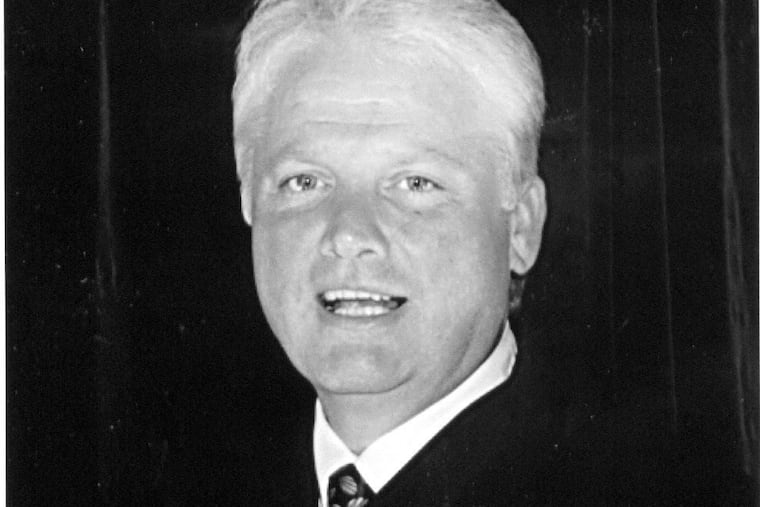Philly judge who wouldn’t wear a mask in his small, windowless courtroom has COVID-19
Common Pleas Court Judge James Murray Lynn, 73, presides over one of the city's busiest courtrooms.

Common Pleas Court Judge James Murray Lynn, who refused to wear a mask while conducting in-person hearings in Family Court, has come down with coronavirus, The Inquirer learned Thursday.
The judge’s positive COVID-19 test set off a wave of health and safety concerns for the scores of people who appeared before the judge in recent days. Philadelphia’s coronavirus infection rate is skyrocketing with no signs of slowing, city health officials said Thursday.
Jane Roh, spokesperson for the District Attorney’s Office, said unit supervisors were notifying prosecutors, along with witnesses and law enforcement officers, who have appeared before Lynn. Roh said at least six prosecutors will be notified, but that number could grow.
“We’re checking to see who had hearings there in the past few weeks,” Roh said.
Lynn did not return phone calls from a reporter. He was not in court on Thursday.
» READ MORE: A longtime Philadelphia judge won’t wear a mask in court, prompting complaints from lawyers and witnesses
Lynn, 73, presides over one of the busiest courtrooms — the small, windowless 5F — in the Family Division at 15th and Arch Streets.
The Centers for Disease Control and Prevention recommends alerting those who have had “close contact” with an infected person. The agency defines that as anyone who may have spent at least 15 minutes within six feet of an infected person over the two days before a positive test result or the onset of symptoms.
Alan J. Tauber, first assistant with the Defender Association of Philadelphia, said his office has yet to receive any formal notification of a positive test.
» READ MORE: Mask-refusing Philly judge has respiratory issue, spokesperson says
Philadelphia’s courts reopened for in-person hearings over the summer after being shuttered in March because of the pandemic.
Upon reopening, Tauber and prosecutors in the District Attorney’s Office complained to the court that Lynn not only repeatedly declined to wear a mask but ordered lawyers in his courtroom to lower their face coverings when speaking.
“Not only was he not wearing a mask, but he was actively ordering counsel to remove their masks while litigating,” Tauber wrote this summer in a sharply worded letter on behalf of both public defenders and prosecutors.
The Aug. 7 letter was addressed to Judge Margaret Murphy, who, as administrative judge for Family Court, has authority over Lynn.
Tauber detailed six instances, from July 29 to Aug. 6, when Lynn did not wear a mask during hearings, which Tauber called a “safety breach” and a violation of the state Department of Health’s July 1 order.
At the time, Martin O’Rourke, spokesperson for the First Judicial District of Philadelphia, said Lynn could not wear a mask while on the bench because he has a respiratory condition that impedes his breathing. He noted that Lynn does wear a mask while walking through the courthouse.
In response to complaints from lawyers, Murphy had workers install plastic glass around Lynn’s bench to protect those in his courtroom from any respiratory droplets.
O’Rourke had said the courtroom was safe because Lynn’s “presiding chair" is located three feet behind a plastic-glass enclosure, and lawyers and clients are at least 15 feet away. He said Lynn asked only one lawyer to “pull down his mask while he was talking” because the judge could not hear him.
The enclosure has one piece of plastic glass, about six feet high, in front of the judge, with two smaller pieces on each side of his bench. It is not floor-to-ceiling, with a gap at the top.
Michael LeVasseur, assistant professor of epidemiology and biostatistics at Drexel University, said, “If the plexiglass opens up at the top, then all of the air is mixing. The droplets might be stopped but it’s not just droplets, there’s also the potential for aerosol, which doesn’t really care about a plexiglass barrier. Smaller droplets can become aerosol."
He questioned why Lynn did not conduct hearings online, as other judges have done, if he was unable to wear a mask.
Murphy, the administrative judge, referred questions to O’Rourke when reached Thursday evening by a reporter. Asked why Murphy had allowed Lynn to do in-person hearings without a mask, O’Rourke said he did have an answer.